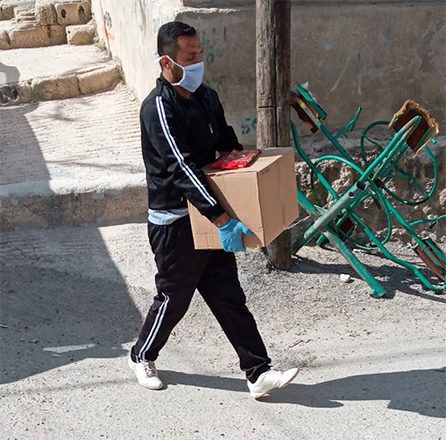You are here
Online lecture underscores impact of coronavirus crisis on society
By Maria Weldali - May 06,2020 - Last updated at May 06,2020
AMMAN — The Arab Renaissance for Democracy and Development (ARDD) on Tuesday held its fourth virtual dialogue session with regard to the subject of social protection policies in the Arab world, underscoring the impact of the coronavirus crisis on all segments of the society.
The session, moderated by the Chair of the Senate Labour and Development Committee Sawsan Majali, focused on finding ways to respond to the crisis and its adverse impact, while guaranteeing fair access for all people to social protection services.
There are many challenges in the Arab world owing to its conflicts, wars and the inequality of the region’s development, Secretary General of the Higher Population Council in Jordan Abla Amawi said during the session which was streamed live on ARDD’s Facebook page.
The most coronavirus-affected countries in the region by population are Qatar and Bahrain as well as the United Arab Emirates, but generally there are not a lot of confirmed COVID-19 case in the region, Amawi, who is also president of the Arab Council for Population and Development, said.
“This is a chance to prepare ourselves for other waves of COVID-19, or even for other deadly viruses and diseases,” Majali expressed during the session, adding that emphasis must be placed on health and social security systems, for they are essential in times of crisis.
“By standing together and joining hands the right way, this crisis could be a chance with various advantages,” Majali further said.
As for Kamel Mahanna, president of the “Amer” International Foundation he said that Arab countries need to have comprehensive policies and not only time-bound strategies and programmes.
“The most important lesson our societies should learn from this crisis is to have respect for human dignity and upon which the policies need to be established,” Mahanna said.
“We stand at a crossroad, either we benefit from this crisis by achieving solidarity or yield to its fears,” he added.
Director of the Humanitarian Aid Department at the Ministry of Planning and International Cooperation in Jordan Omar Neseir said during the session that one third of Jordan’s population are not Jordanians, most of whom are Palestinians, Syrian, Yemeni and Sudanese, numbering 3.6 million.
“Before the pandemic we were facing difficulties due to fund shortages that are allocated for refugees,” Neseir said, adding that in 2019 the amount of funding decreased by 50 per cent of the total estimated need for refugees.
As a direct measure to address the pandemic’s implications donors have been immediately contacted with the aim of targeted support to mitigating economic burdens and bringing more funding to support refugees amid this unprecedented time, Neseir said.
“Amid this crisis, the international community must be committed to its humanitarian role,” Neseir added.
Related Articles
AMMAN — The Arab Renaissance for Democracy and Development (ARDD) organisation held an online panel discussion on Tuesday, titled “The Impac
AMMAN — The Arab Renaissance for Democracy and Development (ARDD) has been providing support to over 16,000 vulnerable families from refugee
AMMAN — The Arab Renaissance for Democracy and Development (ARDD) on Wednesday held a virtual dialogue session on the sustainability of soci















